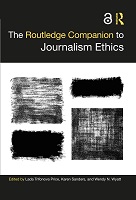Chapter 45 Journalism ethics and its participatory turn
Proposal review
Abstract
Journalism ethics have long relied on a conceptual distinction between professional communicators and their audience in the process of ascribing responsibility. In a time of participation and produsage, however, this distinction has become obsolete. This chapter presents results from three waves of problem-centered interviews with online journalists, media users, and experts from the field of media self-regulation in order to identify and structure the ethical problems of user participation in journalism. The results of the empirical study provide evidence of a participatory turn in journalism ethics, which is, however, by no means complete. Although participants describe similar challenges they encounter in the process of participatory content production, they refer to different sets of norms and values to justify quality judgments about their media products. The analysis shows that the principles of reciprocity and mutuality, as discussed in communitarian ethics and the ethics of care, could serve as new leitmotifs in the future process of shaping a timely ethic of produsage.
Keywords
broadcasting regulation, China, ethical ideology, Ethics, hate speech, Islamic perspective, journalistic practice, Leveson, Media ethics, media representation, moral dilemmas, newsrooms, objectivity, press freedom, privacy,Religious ultra-Orthodoxy, Slow journalism, social media, social responsibility, Ubuntu, whistleblowersDOI
10.4324/9780429262708-51ISBN
9780367206475, 9781032041599, 9780429262708Publisher
Taylor & FrancisPublisher website
https://taylorandfrancis.com/Publication date and place
2022Imprint
RoutledgeClassification
Media studies


 Download
Download